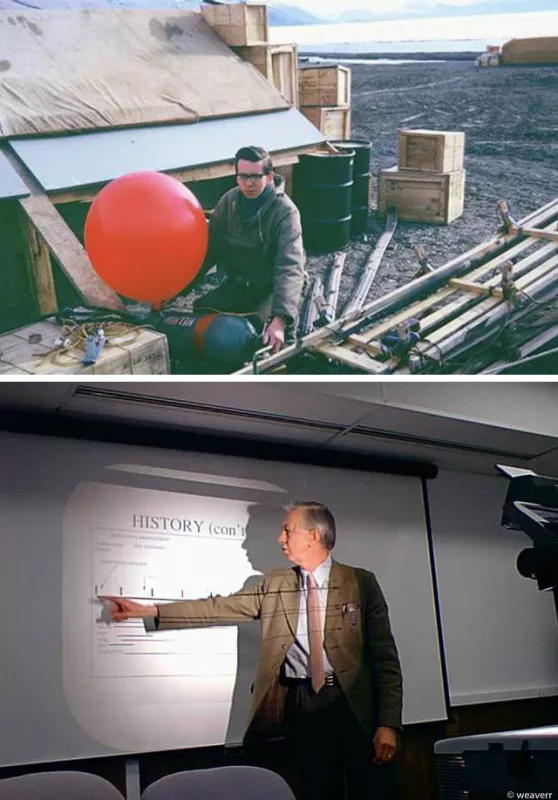Roger G. Barry, founding director of the National Snow and Ice Data Center (NSIDC), passed away on March 19, 2018, concluding a distinguished career in the study of the cryosphere and mountain climates. His work as a scientist and professor, and his dedication to the formation of centers for the study of the cryosphere helped shape the evolution of climate science.
Born in 1935, Barry grew up in the United Kingdom. As a teenager interested in weather, he began working as a scientific assistant at the UK Meteorological Office in 1952. Soon afterwards, he was plotting data at the Royal Air Force Station, Worksop, in Nottinghamshire while taking correspondence courses in math and physics in the evenings. Failing the military’s eyesight test, he applied for a university program related to another early interest: geography. He earned his bachelor’s degree from the University of Liverpool in 1957, his master’s degree from McGill University in 1959, and his Ph.D. from the University of Southampton in 1965. In addition to his own coursework, he accepted a post as an assistant lecturer at the University of Southampton in 1960. He also began learning Russian through a BBC radio program, an endeavor that would later facilitate some of his international collaborations.
In the mid- to late-1960s, Barry hoped to train graduate students, but felt constrained by the UK’s limited research funding. In 1968, he accepted a post at the University of Colorado Boulder as an assistant professor at the Institute of Arctic and Alpine Research (INSTAAR). When the university assumed control of a World Data Center (WDC) for Glaciology in 1976, he became the center’s director.
The center started small, but under Barry’s leadership it grew quickly. At first, the WDC consisted of a library, a glacier photo collection, and a small staff. In 1980, the WDC became a part of the Cooperative Institute for Research in Environmental Sciences (CIRES). In 1982, NOAA designated the NSIDC as coexistent with the WDC, and the center adopted the NSIDC name.
Under Barry’s leadership in 1993, NSIDC became a NASA Distributed Active Archive Center: the NSIDC DAAC. The NSIDC DAAC provides data and information on snow, sea ice, glaciers, ice sheets, ice shelves, frozen ground, soil moisture, cryosphere, and climate interactions, in support of research in global change detection, model validation, and water resource management.
Along with training and recruiting a dedicated staff at NSIDC, Barry also fostered international collaboration. Between 1986 and 2005, several Russian scientists visited NSIDC for extended stays and research, and Barry’s visits to Russia in the 1990s paved the way for multiple U.S.-Russian data-rescue efforts. Meanwhile, one of Barry’s visits to China helped facilitate China’s establishment of its own WDC for Glaciology.
At NSIDC, Barry contributed to the Intergovernmental Panel on Climate Change (IPCC) assessments in 1990, 1995, and 2001. He served as a review editor for IPCC Working Groups 1 and 2 in 2007, an effort that earned the IPCC the Nobel Peace Prize.
Other honors for Barry include Lifetime Career Awards from the Climate and Mountain Specialty groups of the Association of American Geographers, a Fellowship from the American Geophysical Union, the Goldthwait Polar Medal from the Byrd Polar Research Center, the Founder’s Medal from London’s Royal Geographic Society, the Humboldt Prize from the Bavarian Academy of Sciences, a J.S. Guggenheim Memorial Fellowship, and designation as a Distinguished Professor of Geography from the University of Colorado Boulder.
Between 1971 and 2011, Barry supervised 67 graduate students, 36 of whom earned Ph.D. degrees. Over the course of his career, he authored a substantial body of peer-reviewed research as well as numerous textbooks: Atmosphere, Weather and Climate; The Global Cryosphere: Past, Present and Future; Mountain Weather and Climate; Microclimate and Local Climate; Essentials of the Earth’s Climate System; and Synoptic and Dynamic Climatology.
Barry retired as NSIDC director in 2008 and retired from teaching at the University of Colorado Boulder in 2010. Even after his official retirement, he continued to work part-time, along with teaching and writing about climate, weather, and the cryosphere.
In a 2015 paper reviewing his life and work, Barry reflected, “Climatology is a young science, spanning barely half a century, and I have indeed been fortunate to be part of most of it.” He counted among his greatest satisfactions “working with so many brilliant graduate students,” and “establishing NSIDC as a worldwide resource.”
References and Tributes
Barry, R. G. 2015. The shaping of climate science: half a century in personal perspective. History of Geo- and Space Sciences6:87-105. doi:10.5194/hgss-6-87-2015.
Boulder Daily Camera. Roger Barry Obituary. http://www.legacy.com/obituaries/dailycamera/obituary.aspx?n=roger-barr….
Cooperative Institute for Research in Environmental Sciences. Hats off to Barry. http://cires1.colorado.edu/science/spheres/snow-ice/barry.html.
Geography Department, University of Colorado Boulder. “In Memoriam: Professor Emeritus Roger Barry.” https://www.colorado.edu/geography/2018/03/21/memoriam-professor-emeritus-roger-barry.
Global Cryosphere Watch. “A giant has fallen: In Memoriam, Roger Barry” http://globalcryospherewatch.org/news/rgb/roger_barry.html.
National Snow and Ice Data Center. “First 25 years: the history of the WDC for Glaciology and NSIDC in Boulder, Colorado.”
Media Contact
Natasha Vizcarra
National Snow and Ice Data Center, University of Colorado Boulder
press@nsidc.org, +1 303.492.1497

